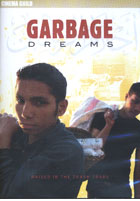
Garbage Dreams 2009
Distributed by Cinema Guild, 115 West 30th Street, Suite 800, New York, NY 10001; 212-685-6242
Produced by Mai Iskander
Directed by Mai Iskander
DVD, color, 79 min.
Jr. High - Adult
Urban Studies, City and Regional Planning, Social Issues, Environmental Studies, Labor Relations, Middle Eastern Studies, Children, Adolescence, Stereotypes
Date Entered: 06/10/2010
ALA Notable: ala.gif
Reviewed by Winifred Fordham Metz, University of North Carolina at Chapel Hill
The largest city in the Middle East with a population of 18 million people, Cairo has no city-wide waste disposal system. Instead, they have relied on a group of people—the Zaballeen—to collect, sort, recycle, re-use and dispose of the city’s garbage for many generations. They are extremely effective in their work, averaging 80% recycling rates on the garbage they collect (to put this in perspective, the film reports that most European companies report only 20% recycling rates on average.) When the city begins hiring private companies from Spain and Italy to officially manage trash collection, the Zaballeen are left to fight for their livelihood. Filmed over four years, director Mai Iskander presents a steady observation of this dilemma and what members of the Zaballeen community do to face it.
Iskander initially camps out in Mokattam (Cairo’s largest garbage village), training her camera on streets teeming with piles of cans, plastic bottles and seemingly disparate bags of trash. Amongst this sea of stuff, four individuals come into focus: three teenage Zaballeen boys—Adham, Nabil, and Osama, and one resident social worker, Laila. While each of their connections to their Zaballeen heritage is unique, Iskander expertly crafts them into the larger framework of the community, providing a rich context of Zaballeen history and its current community dynamic. Recognizing that the fate of the village rests in part on the newest generation of Zaballeen, Laila leverages her central role in the community to begin advocating for modernization and effective education and outreach as tools to combat the European trash collecting companies.
Through a series of achingly earnest interviews (many filmed by the boys themselves), deeply moving personal narratives emerge revealing a communal coming of age story that proves to be the heart of the film. Adham is forced to provide for his entire family when his father is imprisoned for building an unlicensed rooftop apartment. Nabil wants to marry his fiancé, but must prove his financial stability first and Osama desperately wants to find his place of belonging in a world that identifies him amongst a ‘nothing’ class.
When Adham and Nabil are invited to visit Wales to see how other countries collect trash and recycle, they are excited by the prospect of traveling abroad. The youth and naiveté of their world experience are starkly contrasted with their advanced vocational acumen and pragmatic world view on the art of recycling and reuse. Adham is perceptively astonished by the amount of trash not being recycled at the plant in Wales. He picks up a chunk of green glass and reasonably asserts—“this should be recycled, every piece should be recycled.” When his Welsh host comments “that is impossible” Nabil inspects the rest of the seemingly un-recyclable items making their way down the conveyer belt to the landfill pile and counters—“here there is technology, but no precision.” A viewer might surmise that the folks in Mokattam could take a turn as host to teach their recycling and reuse traditions.
Here, Iskander has made a film that conveys a world level problem through a precise example and ultimately underscores the importance of learning globally in conjunction with thinking globally.
This film is highly recommended for people interested in social issues or environmental Middle Eastern studies, and urban studies. The film may easily be used in classrooms to motivate discussions on these and similar topics. Further viewing: Waste Land(2009), Garbage Warrior (2007), Recycled Life(2006).
Awards